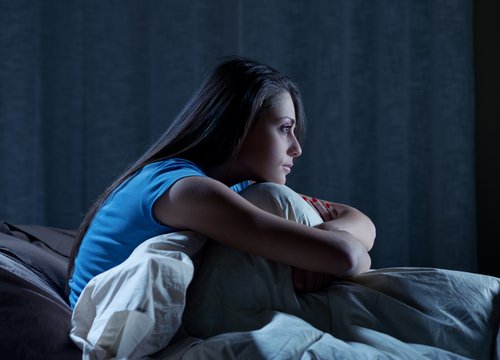Why Am I Always Waking Up at 3 am?

The phenomenon of waking up at 3 in the morning, or thereabouts, is actually more common than you may think. It’s a very common problem, generally caused by sleep disturbances related to anxiety.
However, it’s a phenomenon that needs to be explained in better detail in order to understand it and face it better. Waking up at these hours in the early morning and not being able to fall back to sleep can become a very serious problem if it keeps happening. Because of this, it’s important to know how to properly deal with the situation.
Waking up at 3 AM: associated symptoms

There are many articles that talk about this common phenomenon. However, we must remember that there’s nothing strange about it. It’s actually the brain’s reaction to an elevated level of anxiety that we’re currently experiencing. Having said that, when it begins to consistently impair our sleep, it needs to be dealt with.
It’s important to keep in mind the symptoms that often accompany waking up at 3 or 4 AM:
- Waking up feeling intense anxiety and restlessness.
- Heart palpitations and a sense of danger.
- Getting back to sleep is impossible. This increases nervousness, negative thoughts and sleeplessness.
- If you do manage to get back to sleep, it’s a light sleep and you wake up feeling tired.
- Repeatedly waking up at 3 or 4 am a few times per week.
See also: 8 Natural Remedies for Controlling Nervous Anxiety
Anxiety and waking up during the early morning hours
Why am I always waking up at 3 in the morning?
If you suddenly wake up in the early hours of the morning at the same time, you need to ask yourself why. The first thing you need to ask yourself is whether you’re worried about something. The second is whether you are working too much, and the third is if you are suffering from some sort of emotional problem.
All of these factors can cause anxiety that we might not always be aware of. As a result, our brain responds in such a way that our sleep is affected. We start to have problems falling asleep, and, when we do get to sleep, the accumulated anxiety causes us to wake up with a sense of threat.
Let’s take a closer look:
- Anxiety directly alters the central nervous system (CNS). The CNS starts to make small changes in the bio and neuro-chemical systems involved in the sleep-wake cycle. The result of this is that is an alteration in our sleep stages (REM and non-REM).
- We often go to bed and have a hard time getting to sleep. We end up falling asleep around midnight, but anxiety causes our sleep to be interrupted. It’s then harder to reach the REM stage, where sleep is deep and restorative. Our brain interprets this anxiety as a threat and as something that we have to get away from. We sense this alert and end up waking up after just a few hours at around 3 in the morning.
- This is our body’s natural reaction to anxiety and it alters our neurotransmitters, causing changes in our sleep patterns.
What can we do about this problem?

If the cause of sleep disturbances is anxiety, we need to confront the sources of this stress and anxiety if we want a good night’s rest.
- It’s important to acknowledge that something is going on. Waking up in the middle of the night with a feeling of dread or threat is a sure sign that something is not right. Ask yourself why that is. Ask yourself what’s going on in your life that’s bothering you, making you unhappy and why you feel threatened.
- Make small changes in your life, set priorities, and try establishing new habits to stimulate your brain and vent stress.
- Try taking a walk after dinner for at least a half hour. Walk, breathe deeply, put things into perspective. Relax.
- When you get home, take a relaxing bath and go to bed. The last thing you need to be thinking is, “I need to sleep well all night in order to perform tomorrow.” This thinking creates stress in your brain because it sees it as an obligation: “I have to sleep.”
- Clear your mind and quieten your thoughts.
- Make sure your room is clean and well ventilated and fresh smelling. According to experts, the best temperature for sleeping is 68°F. Once the temperature rises beyond 77°, it’s hard for the body to get comfortable. Keep these things in mind and these interruptions to your sleep will surely disappear!
This text is provided for informational purposes only and does not replace consultation with a professional. If in doubt, consult your specialist.








